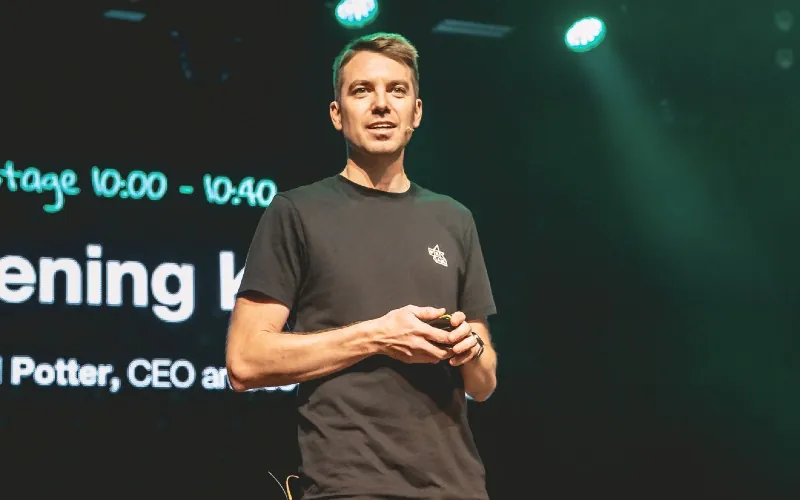The UK’s growth-oriented AI policies are in reliable hands with Labour after the previous government’s narrow focus on safety.
That’s the view of Richard Potter, co-founder and CEO of Manchester-headquartered AI leader Peak.
Potter was among several AI leaders to be consulted last year for Matt Clifford CBE’s AI Opportunities Action Plan, which made 50 recommendations for the government to harness the potential of this transformative technology.
Prime Minister Keir Starmer subsequently unveiled a blueprint which agreed to take forward all 50 recommendations and was described as a ‘marked move’ from the previous Conservative administration’s approach of targeting AI with heavy regulation.
Potter, who founded Peak with Atul Sharma and David Leitch in 2015, told BusinessCloud that the government roundtable last year featured “almost predominantly UK AI CEOs or founders”.
“The folks from government who were there really understood the domain; Matt himself understands the domain,” he explains. “So that’s really encouraging.
“I feel like they’re listening to the right people, and they understand what they’re talking about.
“The prior government held an AI Safety Summit [in late 2023] which focused on one part of what should be a bigger topic… and they invited all the big US tech companies and excluded the UK ones.
“This government’s streets ahead, in my opinion, in terms of how it is approaching the topic.”
Potter was recently invited back to Downing Street for an event to celebrate the AI ecosystem.
“It was a relatively small affair. The Prime Minister gave a talk and, again, the right people were in the room, saying the right things,” he says.
One of the people delivering their vision for the future of AI in the UK was Poppy Gustafsson, former CEO of Darktrace, who is now Minister of State for Investment.
Catalyst
Potter urged the government to look more broadly at ways for catalysing the ecosystem. Writing on LinkedIn following the recent event, he said: “I’d still encourage improvements to specific policies (EMI options, EIS funding and R&D credits), as well as fiscal (BADR), trade (post-Brexit) and attempting to solve the barriers faced by UK startups in accessing growth capital.”
Potter has previously written that the AI Opportunities Action Plan lacks focus on startups and scaleups and that the government must prioritise nurturing these businesses.
“They must also look at: how do we help technology companies grow and scale and be successful? How do we get outsized outcomes in this country?” he adds to BusinessCloud.
“There are some policies and changes we could make that are not AI-specific, but broadly would really catalyse that. For me, creating the general business conditions for success should be part of the AI strategy.
“But they’re listening – so I’m positive.”
Impartial referee or first to mass adoption? Tech industry reacts to Starmer’s AI plan
Agentic AI
Peak’s AI platform optimises product inventory and pricing for businesses generating anything from millions to billion in revenues.
Its clients include retailers boohoo, Footasylum and AO; global brands such as Molson Coors Nike and PepsiCo; and building materials including Marshalls.
It has also launched an ‘agentic assistant’, Co:Driver, which claims to surface business-specific information on demand in seconds to help people to make faster, more informed decisions.
Potter says such agents are “the big development for both enterprise software and the generative space”.
“The agent turns the LLM (large language model) into a valuable application,” he explains. “Businesses focus on: how do we make money? Why are we successful? How do we get better and then apply the right technology to that?
“If you’re a business that sells products to other businesses then that is always going to have the human touch. You’re always going to be more successful as a great salesperson talking to a human – but you can support that great salesperson with task automation and extra information that makes them much more productive. So in this case, you aren’t replacing the sales team with AI, you are augmenting it.
“During the Big Data wave – which was a technology looking for a problem to solve – the focus was on getting all the data in one place then finding things to do with it. And that never really quite happened.
“But now the companies who invested in a really strong data foundation will be able to take advantage of this wave of AI way better than those who haven’t – so weirdly, it’s come full circle.
“We don’t call it Big Data anymore, but we need it in order to power the AI applications.”
Peak performance
In 2021 Peak raised $75m Series C funding in a round led by SoftBank’s Vision Fund II. It is also backed by other category-leading VCs in MMC Ventures, Oxx, Praetura Ventures, Arete and Octopus Ventures.
Following rapid growth in its global workforce, Peak’s co-founders wrote a blog in early 2023 to explain that it was not immune from the economic downturn impacting SaaS companies.
The post highlighted “the need to plot a more efficient path going forward… sadly, this means we must part with some of our talented and valued teammates”.
Potter says that growth has been sustained since the investment – with sales higher today than ever before – and that the streamlined business of today employs around 150 staff.
“We’re growing really strongly at the moment. I’m very excited for the year ahead,” he says.
“We had to make some really difficult and serious decisions, and it’s not been without its pain. But now we’re in a position where we’ve got a huge world of opportunity.
“The business is performing really well. We got really proud of the product and the team that we built.”


